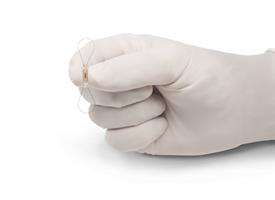New sensor to monitor heart failure symptoms, reduce hospitalization

Cardiologists at UR Medicine's Strong Memorial Hospital have introduced a new implantable miniaturized, wireless monitoring sensor to manage heart failure and reduce the number of times people with this life-threatening disease need to be hospitalized.
The CardioMEMS HF System measures pulmonary artery pressure, which is an indirect measure of worsening heart failure. A monitor built into a pillow allows the system to transmit daily information from patients' homes directly to the heart failure team at Strong Memorial, allowing for personalized and proactive care to reduce the likelihood of hospitalization.
"This technology is innovative and benefits patients who may suffer with worsening heart failure well before we were able to detect it," said Leway Chen, M.D., M.P.H., director of the Heart and VascularProgram in Heart Failure and Transplantation. "The sensor lets us detect changes in a patient's heart function that could significantly risk their health and require hospitalization."
A 51-year-old Kenneth Moore of Jordan, near Auburn, was the first patient at Strong Memorial Hospital to receive the 4.5 centimeter device. A former auto mechanic, Moore is optimistic it will help end the frequent hospitalizations for fluid retention in his lungs, which makes it difficult to breathe. It's happened four times in the past 18 months for Moore, a father of two.
His heart trouble began in 2012 when he suffered a severe heart attack. Cardiologists James Connelly, M.D., in Auburn, and Traian Anghel, M.D., in Syracuse, managed his care for several years, until his heart function worsened and he needed advanced care from UR Medicine's specialty team. There are more than 5 million people living with heart failure in the United States.
Himabindu Vidula, M.D., M.S., said the frequency of Moore's symptoms made him an ideal candidate for the device, which is made by St. Jude Medical. Fluid retention is a serious problem for people with heart failure and is often not obvious until it impedes breathing. When the heart muscle isn't strong enough to pump all the blood from the left ventricle, pressure inside the heart rises and causes shortness of breath. The CardioMEMS device records those changes and sends the information to heart failure experts, allowing them to consider changes in therapy.

















